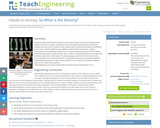
Students review what they know about the 20 major bones in the human body (names, shapes, functions, locations, as learned in the associated lesson) and the concept of density (mass per unit of volume). Then student pairs calculate the densities for different bones from a disarticulated human skeleton model of fabricated bones, making measurements via triple-beam balance (for mass) and water displacement (for volume). All groups share their results with the class in order to collectively determine the densities for every major bone in the body. This activity prepares students for the next activity, "Can It Support You? No Bones about It," during which they act as biomedical engineers and design artificial bones, which requires them to find materials of suitable density to perform as human body implants.
- Subject:
- Anatomy/Physiology
- Engineering and Information Technologies
- Life Science
- Material Type:
- Activity/Lab
- Provider:
- TeachEngineering
- Provider Set:
- TeachEngineering
- Author:
- Jeanne Hubelbank
- Kristen Billiar
- Michelle Gallagher
- Terri Camesano
- Date Added:
- 10/14/2015